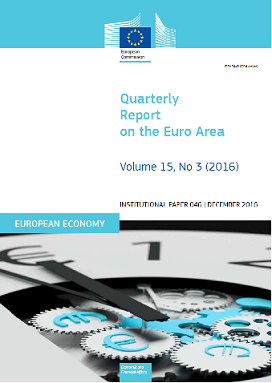European Commission, (2016), “Quarterly Report on the Euro Area – No 3 (2016)”, Institutional Paper 046, Δεκέμβριος
In his State of the Union address in September, Commission President Jean-Claude Juncker stressed that the European Union (EU) ‘is, at least in part, in an existential crisis’. He urged leaders to pull together to stop the EU unravelling in a challenging environment of low trust, rising populism and greater focus on domestic problems in several Member States. One important reason for the worrisome situation is the sluggish recovery from the Great Recession. While growth has proven resilient in recent quarters and GDP in the euro area is now higher than before the crisis, the recovery has remained slow compared to past recoveries and inflation remains persistently low. Also, the rising current account surplus reflects a weaker dynamics of internal demand relative to output. Substantial slack persists in the economy, in particular in the labour market, with the unemployment rate still in double digits and a low number of total hours worked. The modest recovery has been strongly dependant on external demand and monetary policy. The ECB has brought policy rates to the zero lower bound and launched a series of unconventional policy measures, which have resulted in an increase in its balance sheet. While this has helped sustain the recovery, there is now a consensus that it would be a mistake to rely on monetary policy alone.
Σχετικές Αναρτήσεις
- European Commission, (2016), “Quarterly Report on the Euro Area”, Vol.15, No.2, Institutional Paper 030, Ιούλιος
- European Commission, (2016), “Quarterly Report on the Euro Area”, Volume 15, No 1, Institutional Paper 024, Απρίλιος




